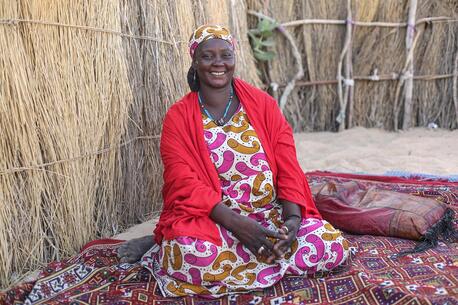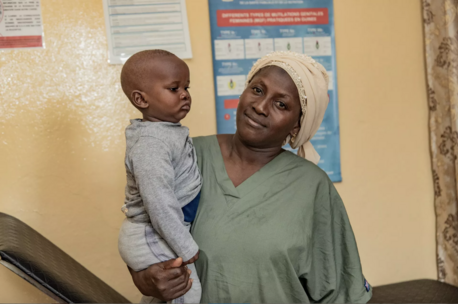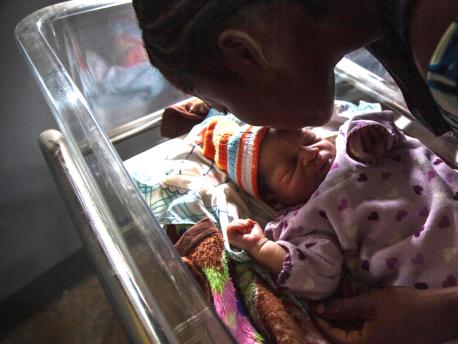
Vaccines Protect Mothers and Babies in Mali From Maternal and Neonatal Tetanus
In 2023, the World Health Organization announced that Mali had successfully eliminated maternal and neonatal tetanus (MNT), an excruciating disease that kills tens of thousands of infants every year. One mother shares how the tragic loss of her newborn son led her to become an advocate, encouraging all women of child-bearing age to get vaccinated to protect the health of their future children.
Tetanus is vaccine-preventable, yet it kills tens of thousands of infants worldwide every year
The dawn was slowly rising over the village of Abaradjou in the health district of Sankoré in Mali's Tombouctou region. Once flourishing, the region was struggling with maternal and neonatal tetanus (MNT), an acute infectious disease that threatens the survival of mothers and their infants.
Caused by a bacterium found in the soil and in animal droppings, MNT results from the contamination of the umbilical stump during unhygienic cord care at childbirth. Symptoms usually occur from the third day in a newborn who was normal and suddenly becomes rigid, presenting with uncontrollable convulsions and muscle spasms. Without medical care, the mortality rate is nearly 100 percent.

Unsafe birth practices threaten the lives of newborns
In this neighborhood, as elsewhere in Mali, deliveries were often performed by traditional midwives, using contaminated equipment. This practice, coupled with adherence to ancient rituals, unfortunately made tetanus contamination all too common during deliveries.
Aissata, a 46-year-old resident of Abaradjou, was determined to change her fate. Having already lost a baby to this disease, she resolved not to let history repeat itself.
They did everything they could, but the baby passed away. The doctor explained to me that it was tetanus and that if I had been vaccinated during pregnancy, it could have saved my baby. Losing a child is terrible and I wouldn't wish it on any parent. — Aissata, a 46-year-old mother in Mali
"I gave birth at home assisted by a grandmother," says Aissata. "A few days later, the baby couldn’t breastfeed, and his condition was getting worse. So, I took him to the health center. They did everything they could, but the baby passed away. The doctor explained to me that it was tetanus and that if I had been vaccinated during pregnancy, it could have saved my baby. Losing a child is terrible and I wouldn't wish it on any parent."
Aware of the risks, Aissata sought out information and learned from a women's group in her village about a new initiative by the Malian government, with support from UNICEF and WHO, targeting the elimination of maternal and neonatal tetanus. Inspired by the possibility of a different ending for her story, Aissata decided to actively protect any future pregnancies by getting the tetanus vaccine.

Spreading the word from one mother to another: tetanus vaccines work
The very next day, as if in answer to her determination, an advanced strategy team arrived by motorcycle in Aissata’s village to administer the tetanus vaccine to all women of reproductive age (pregnant or not). Aissata was among the first to receive her dose and made the significant choice to travel to the Sankoré community health center for the remaining doses of the vaccine. The road was long and arduous, but the hope of a better outcome for her future pregnancies sustained her.
"Today I am talking about my story to the women in my village and I am telling them to get vaccinated against tetanus and to have check-ups during pregnancy. When I talk about my story, some tell me that they have also lost babies following home births." recounts Aissata, after finishing an educational talk with other women from her village.
Today I am talking about my story to the women in my village and I am telling them to get vaccinated against tetanus and to have check-ups during pregnancy. — Aissata
In 2023, the World Health Organization (WHO) announced that Mali had officially eliminated maternal and neonatal tetanus, a major advance for public health in a country where maternal and infant mortality rates are among the highest in the world. This status was confirmed following a detailed evaluation, which demonstrated that Mali meets WHO's standard of having less than one case of neonatal tetanus per 1,000 live births in each of its health districts.

A comprehensive strategy to strengthen vaccine delivery systems
Mali's significant milestone is a testament to the collective efforts of the country and its partners, including UNICEF. A comprehensive strategy to strengthen systematic vaccination played a pivotal role. Health centers across Mali were equipped with solar refrigerators to store vaccines efficiently, and provided with motorcycles and vehicles to facilitate the delivery of vaccination services.
Vaccinations were administered through a well-organized approach: at health facilities for fixed strategies, by motorcycle for areas located between 5 and 15 kilometers away, and through mobile clinics for communities more than 15 kilometers from a health facility.

Health worker training reduces the risk of tetanus contamination
From 2002, Mali embarked on several vaccination campaigns against tetanus, adopting fixed, advanced and mobile strategies. These efforts were significantly supported by financial contributions from the United States, underscoring the global commitment to combatting MNT. The vaccination program proved to be a lifeline for thousands of women, including Aissata.
Childbirth practices in Mali also saw remarkable improvements through the gradual introduction of qualified personnel including gynecologist-obstetricians, midwives and obstetric nurses into health centers and district hospitals. This initiative was supported by the state and partners like the World Bank to enhance the quality of maternal care.
Traditional midwives, integral to many communities, received training on essential hygiene practices to further reduce the risk of tetanus contamination. The training emphasized the importance of maintaining clean surfaces, hands and clothes during childbirth, using a new blade for umbilical cord cutting, applying chlorhexidine for cord care and avoiding the application of potentially harmful substances on the umbilical wound. Through these comprehensive measures, Mali has made significant strides in safeguarding the health of mothers and newborns against tetanus.
“These practices have saved millions of women of childbearing age and newborns while protecting them against tetanus,” explains Dr. Moumini Guindo, a physician at the Sankoré community health center.

MNT has been eliminated in all but 11 countries
Aissata's determination and resilience are a symbol of the possibility of change and the power of taking proactive steps towards health and safety. In this region of Mali, her fight against MNT, marked by courage and transformation, serves as an inspiration for many women — a new dawn for an era of health awareness and empowerment in the community.
UNICEF has immunized millions of women all over the globe, with support from partners like Kiwanis International and The Church of Jesus Christ of Latter-Day Saints, in an effort to eliminate tetanus in dozens of countries. As of December 2023, MNT remains endemic in just 11 countries.
Help UNICEF deliver vaccines to protect children from deadly diseases.
This story was originally published on unicef.org
HOW TO HELP
There are many ways to make a difference
War, famine, poverty, natural disasters — threats to the world's children keep coming. But UNICEF won't stop working to keep children healthy and safe.
UNICEF works in over 190 countries and territories — more places than any other children's organization. UNICEF has the world's largest humanitarian warehouse and, when disaster strikes, can get supplies almost anywhere within 72 hours. Constantly innovating, always advocating for a better world for children, UNICEF works to ensure that every child can grow up healthy, educated, protected and respected.
Would you like to help give all children the opportunity to reach their full potential? There are many ways to get involved.





